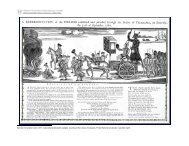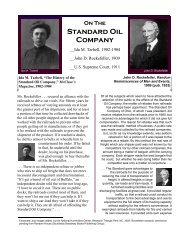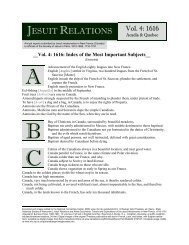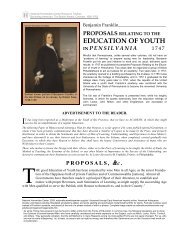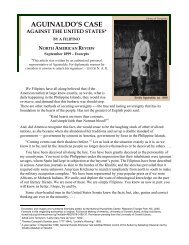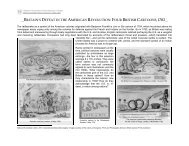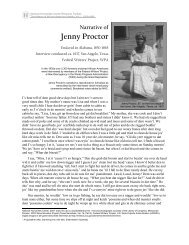Report on the autopsy of an Inuit man - National Humanities Center
Report on the autopsy of an Inuit man - National Humanities Center
Report on the autopsy of an Inuit man - National Humanities Center
You also want an ePaper? Increase the reach of your titles
YUMPU automatically turns print PDFs into web optimized ePapers that Google loves.
1577_____________The Death <strong>of</strong> <strong>an</strong><br />
<strong>Inuit</strong> M<strong>an</strong> in Engl<strong>an</strong>d<br />
* Postmortem report <strong>an</strong>d comments<br />
<strong>of</strong> Dr. Edward Dodding (Excerpts)<br />
Trustees <strong>of</strong> <strong>the</strong> British Museum<br />
In 1577 Martin Frobisher returned to Engl<strong>an</strong>d from his sec<strong>on</strong>d<br />
voyage in search <strong>of</strong> a northwest passage around <strong>the</strong> c<strong>on</strong>tinent <strong>of</strong><br />
North America. With him he brought three <strong>Inuit</strong>s from Baffin Isl<strong>an</strong>d, a<br />
m<strong>an</strong>, a wom<strong>an</strong>, <strong>an</strong>d her child, who had been forcibly taken from <strong>the</strong><br />
isl<strong>an</strong>d. All so<strong>on</strong> died after <strong>the</strong>ir arrival in Engl<strong>an</strong>d, <strong>the</strong> m<strong>an</strong> from <strong>an</strong><br />
untended broken rib that eventually punctured his lung. Dr. Edward<br />
Dodding performed <strong>the</strong> <strong>autopsy</strong> <strong>on</strong> <strong>the</strong> body <strong>of</strong> “Calichoughe.”<br />
8 November 1577.<br />
When <strong>the</strong> body had been dissected, <strong>the</strong> first thing to claim<br />
my attenti<strong>on</strong> was two ribs; <strong>the</strong>se had been badly broken, in<br />
sustaining a fall <strong>of</strong> some force <strong>an</strong>d impact, <strong>an</strong>d were still gaping<br />
apart without having knit toge<strong>the</strong>r. Ei<strong>the</strong>r <strong>the</strong> care <strong>of</strong> <strong>the</strong>m had<br />
been neglected, as tends to happen in such very hectic<br />
circumst<strong>an</strong>ces <strong>an</strong>d restricted ship-board c<strong>on</strong>diti<strong>on</strong>s or (which I<br />
suspect is more likely) some c<strong>on</strong>taminati<strong>on</strong>, which nobody<br />
noticed, had excited inflammati<strong>on</strong> <strong>an</strong>d <strong>the</strong> c<strong>on</strong>tusi<strong>on</strong> <strong>of</strong> <strong>the</strong> lung<br />
had, in <strong>the</strong> course <strong>of</strong> time, become putrified as a result.<br />
This c<strong>on</strong>diti<strong>on</strong>, aggravated by <strong>the</strong> harmful cold outside <strong>an</strong>d<br />
intensified by poor diet, was in <strong>the</strong> me<strong>an</strong>time nei<strong>the</strong>r put right<br />
from outside by surgery nor arrested from within by medicines,<br />
so that it rapidly developed unchecked day by day into <strong>an</strong><br />
incurable ulcer <strong>of</strong> <strong>the</strong> lung. . . .<br />
When he was am<strong>on</strong>g us, his diet was too liberal ei<strong>the</strong>r for <strong>the</strong><br />
severity <strong>of</strong> <strong>the</strong> disease to tolerate or <strong>the</strong> m<strong>an</strong>’s habitual daily<br />
way <strong>of</strong> life to sustain. This situati<strong>on</strong> was brought about by <strong>the</strong><br />
utmost solicitousness <strong>on</strong> <strong>the</strong> part <strong>of</strong> that great m<strong>an</strong>, <strong>the</strong> Captain<br />
[Frobisher], <strong>an</strong>d by boundless generosity from those with whom<br />
he lodged. Every<strong>on</strong>e’s judgement was deceived ra<strong>the</strong>r by <strong>the</strong><br />
hidden nature <strong>of</strong> <strong>the</strong> disease, <strong>an</strong>d by misguided kindness, th<strong>an</strong><br />
by ill-will; but when, shortly before his death, <strong>the</strong> nature <strong>of</strong> his<br />
illness expressed itself in <strong>the</strong> ra<strong>the</strong>r obvious symptom <strong>of</strong><br />
breathlessness, he was already a victim <strong>of</strong> dropsy [swelling <strong>of</strong><br />
<strong>an</strong>y org<strong>an</strong> or tissue due to accumulati<strong>on</strong> <strong>of</strong> excess fluid]. . . .<br />
. . . [T]here was, you might say, <strong>an</strong> “Anglophobia,” which he<br />
had from when he first arrived, even though his fairly cheerful<br />
features <strong>an</strong>d appear<strong>an</strong>ce c<strong>on</strong>cealed it <strong>an</strong>d gave a false impressi<strong>on</strong><br />
with c<strong>on</strong>siderable skill. His own acti<strong>on</strong>s, however, ei<strong>the</strong>r<br />
betrayed it openly <strong>an</strong>d exposed it (as it seemed to me when I<br />
was looking into individual things more closely <strong>an</strong>d mistrusting<br />
everything), or else betokened <strong>an</strong> incipient fatal illness (as I<br />
declared <strong>of</strong>ten enough, but nobody would listen). These signs<br />
<strong>Inuit</strong> m<strong>an</strong>, wom<strong>an</strong>, <strong>an</strong>d child<br />
brought to Engl<strong>an</strong>d by Martin Frobisher<br />
(watercolors probably by John White)<br />
* Excerpted <strong>an</strong>d images added by <strong>the</strong> Nati<strong>on</strong>al Hum<strong>an</strong>ities <strong>Center</strong>, 2006: www.nhc.rtp.nc.us/pds/pds.htm. In PRO (Public Record Office, UK), State Papers,<br />
Domestic, SP 12/118, 40, I; published in Richard Coelins<strong>on</strong>, The Three Voyages <strong>of</strong> Martin Frobisher (L<strong>on</strong>d<strong>on</strong>, Hakluyt Society, 1867), pp. 189-191.<br />
Complete image credits at www.nhc.rtp.nc.us/pds/amerbegin/imagecredits.htm.
Library <strong>of</strong> C<strong>on</strong>gress<br />
became more clearly<br />
recognizable <strong>an</strong>d c<strong>on</strong>firmed<br />
from <strong>the</strong> state <strong>of</strong><br />
his pulse ra<strong>the</strong>r th<strong>an</strong><br />
from himself: for this<br />
was all <strong>the</strong> time too<br />
small, too sluggish <strong>an</strong>d<br />
too weak ra<strong>the</strong>r th<strong>an</strong><br />
too slow, although it<br />
was also slower th<strong>an</strong><br />
ei<strong>the</strong>r his youth or his<br />
bilious [ill-tempered]<br />
temperament would<br />
require.<br />
In <strong>the</strong> early <strong>on</strong>set <strong>of</strong><br />
<strong>the</strong> illness, I was<br />
summ<strong>on</strong>ed when his<br />
strength was still unimpaired;<br />
with much argument<br />
I recommended<br />
bloodletting, in order<br />
that, by quenching <strong>the</strong><br />
fire <strong>of</strong> <strong>the</strong> inflammati<strong>on</strong><br />
<strong>an</strong>d reducing <strong>the</strong><br />
Jodocus H<strong>on</strong>dius, map <strong>of</strong> <strong>the</strong> world (Vera totius expediti<strong>on</strong>is nauticæ), ca 1595, detail; general<br />
qu<strong>an</strong>tity <strong>of</strong> matter, <strong>the</strong>y<br />
route <strong>of</strong> Frobisher marked.<br />
might both subside.<br />
But <strong>the</strong> foolish, <strong>an</strong>d<br />
<strong>on</strong>ly too uncivilised, timidity <strong>of</strong> this uncivilised m<strong>an</strong> forbade it, <strong>an</strong>d <strong>the</strong> judgement <strong>of</strong> those with whom he<br />
was sailing prevailed with me.<br />
In <strong>the</strong> end, having been called <strong>the</strong> hour before <strong>the</strong> <strong>on</strong>e in which he died, I found everything threatening<br />
imminent death,⎯<strong>an</strong>d no w<strong>on</strong>der, for his speech was impaired <strong>an</strong>d almost cut <strong>of</strong>f, his appetite faded <strong>an</strong>d<br />
pulse n<strong>on</strong>-existent. Quite enough! He summ<strong>on</strong>ed up to a certain extent all <strong>the</strong> energies <strong>an</strong>d faculties which he<br />
had ab<strong>an</strong>d<strong>on</strong>ed, came back to himself as if from a deep sleep <strong>an</strong>d recognised us as people he knew. But I<br />
turned my attenti<strong>on</strong> to medicati<strong>on</strong>, <strong>an</strong>d he spoke those words <strong>of</strong> ours which he had learned, <strong>the</strong> few that he<br />
could, <strong>an</strong>d in turn replied quite relev<strong>an</strong>tly to questi<strong>on</strong>s. And he s<strong>an</strong>g clearly that same tune with which <strong>the</strong><br />
comp<strong>an</strong>i<strong>on</strong>s from his regi<strong>on</strong> <strong>an</strong>d r<strong>an</strong>k had ei<strong>the</strong>r mourned or cerem<strong>on</strong>ially marked his final departure when<br />
<strong>the</strong>y were st<strong>an</strong>ding <strong>on</strong> <strong>the</strong> shore (according to those who heard <strong>the</strong>m both): just like <strong>the</strong> sw<strong>an</strong>s who foresee<br />
what good <strong>the</strong>re is in death, <strong>an</strong>d die happily with a s<strong>on</strong>g. I had scarcely left him when he moved from life to<br />
death, forcing out as his last words, given in our l<strong>an</strong>guage, “God be with you.”<br />
I was bitterly grieved <strong>an</strong>d saddened, not so much by <strong>the</strong> death <strong>of</strong> <strong>the</strong> m<strong>an</strong> himself as because <strong>the</strong> great<br />
hope <strong>of</strong> seeing him which our most gracious Queen had entertained had now slipped through her fingers, as it<br />
were, for a sec<strong>on</strong>d time. But <strong>the</strong> heroes <strong>of</strong> <strong>the</strong>se new <strong>an</strong>d subst<strong>an</strong>tial acts <strong>of</strong> gall<strong>an</strong>try are affected by a much<br />
greater sadness, for <strong>the</strong>y have been deprived <strong>of</strong> <strong>the</strong> rewards <strong>an</strong>d prizes for <strong>the</strong> truly Hercule<strong>an</strong> labour which<br />
<strong>the</strong>y have carried out. To express my opini<strong>on</strong>, <strong>the</strong>se men c<strong>an</strong> in all justice expect <strong>the</strong> highest recogniti<strong>on</strong> <strong>on</strong><br />
our part, for <strong>the</strong>y have triumph<strong>an</strong>tly survived those expediti<strong>on</strong>s by sea,⎯tortuous <strong>an</strong>d comfortless that <strong>the</strong>y<br />
indeed were, <strong>an</strong>d obviously unachieved before this time. They have undertaken enormous tasks, bringing to<br />
<strong>the</strong> kingdom <strong>an</strong>d posterity adv<strong>an</strong>tages greater th<strong>an</strong> <strong>the</strong> hazards, <strong>an</strong>d to <strong>the</strong>ir own names supreme glory; <strong>an</strong>d<br />
<strong>the</strong>y have dem<strong>on</strong>strated that what he has undertaken to do he had succeeded in. . . .<br />
. . . If <strong>the</strong> libati<strong>on</strong>-vessels [cups c<strong>on</strong>taining poti<strong>on</strong>s] <strong>of</strong> inc<strong>an</strong>tati<strong>on</strong>-makers [medicine men who used ch<strong>an</strong>ts<br />
to cast spells <strong>an</strong>d work magic]; begged-for effigies [hum<strong>an</strong> figures or dolls used in healing cerem<strong>on</strong>ies],<br />
vacuous [empty] rituals <strong>an</strong>d magic charms had been <strong>of</strong> <strong>an</strong>y avail in overcoming disease, this m<strong>an</strong><br />
Calichoughe (for that was his name) would, while he was still alive, have hacked it [<strong>the</strong> disease] <strong>of</strong>f<br />
Nati<strong>on</strong>al Hum<strong>an</strong>ities <strong>Center</strong> 2
quivering like a hydra-head <strong>an</strong>d <strong>the</strong>n<br />
thrown it away. For nobody was<br />
more practised th<strong>an</strong> he in this art,<br />
<strong>an</strong>d (unless I am mistaken) nobody<br />
trusted more deeply in those very<br />
superstiti<strong>on</strong>s; he made <strong>an</strong> inc<strong>an</strong>tati<strong>on</strong><br />
for every time his pain abated.<br />
I showed <strong>the</strong> body to <strong>the</strong> wom<strong>an</strong>,<br />
who was troubled at <strong>the</strong> time with<br />
boils (which broke out very densely<br />
<strong>on</strong> her skin next day, when this was<br />
written); <strong>an</strong>d at my persuasi<strong>on</strong> she<br />
was led with me, albeit unwillingly,<br />
to <strong>the</strong> burial,⎯which I purposely<br />
w<strong>an</strong>ted to be carried through without<br />
cerem<strong>on</strong>y, lest <strong>the</strong>re be impl<strong>an</strong>ted in<br />
her <strong>an</strong>y fears about hum<strong>an</strong> sacrifice<br />
am<strong>on</strong>g us. She was kept <strong>the</strong>re all <strong>the</strong><br />
time until <strong>the</strong> body had been<br />
completely covered over with earth;<br />
I showed her hum<strong>an</strong> b<strong>on</strong>es which<br />
had been dug up, <strong>an</strong>d made her<br />
underst<strong>an</strong>d that we all were to be<br />
buried in <strong>the</strong> same way. This I did in<br />
order to remove from her mind all<br />
<strong>an</strong>xiety about hum<strong>an</strong> flesh being<br />
eaten (a practice which had become<br />
deeply rooted am<strong>on</strong>g <strong>the</strong>m), <strong>an</strong>d that<br />
she might learn to put aside <strong>the</strong> fear<br />
Trustees <strong>of</strong> <strong>the</strong> British Museum<br />
“Englishmen in a skirmish with <strong>Inuit</strong>,” watercolor probably by John White,<br />
who may have accomp<strong>an</strong>ied <strong>the</strong> 1577 Frobisher expediti<strong>on</strong><br />
henceforward.<br />
But that wom<strong>an</strong> ei<strong>the</strong>r excelled<br />
all our people in decorum <strong>an</strong>d stoicism or else was far outstripped in hum<strong>an</strong> sensitivity by <strong>the</strong> wild <strong>an</strong>imals<br />
<strong>the</strong>mselves. For she was not in <strong>an</strong>y way disturbed by his death, <strong>an</strong>d, as far as we ga<strong>the</strong>red from her<br />
expressi<strong>on</strong>, it did not distress her. So much so that, by this most recent behaviour <strong>of</strong> hers, she has expressed<br />
quite clearly what we had l<strong>on</strong>g before arrived at by c<strong>on</strong>jecture: that she had regarded him with <strong>an</strong> ast<strong>on</strong>ishing<br />
degree <strong>of</strong> c<strong>on</strong>tempt, <strong>an</strong>d that although <strong>the</strong>y used to sleep in <strong>on</strong>e <strong>an</strong>d <strong>the</strong> same bed, yet nothing had occurred<br />
between <strong>the</strong>m apart from c<strong>on</strong>versati<strong>on</strong>,⎯his embrace having been abhorrent to her.<br />
Goodbye.<br />
Yours, as you know,<br />
Edward Dodding<br />
Bristol, November 8 th [1577]<br />
__________________________<br />
“Had hardy Ulysses not seen<br />
Such d<strong>an</strong>ger-ridden days,<br />
How happy for Penelope;<br />
And yet how little praise!”<br />
Burial records, 1577, in <strong>the</strong> register <strong>of</strong> St. Stephen’s Church, Bristol, Engl<strong>an</strong>d: *<br />
Collich<strong>an</strong>g a hea<strong>the</strong>n m<strong>an</strong> buried <strong>the</strong> 8 th <strong>of</strong> November<br />
Egnock a hea<strong>the</strong>n wom<strong>an</strong> buried <strong>the</strong> 12 th <strong>of</strong> November<br />
* “Collich<strong>an</strong>g/Calichoughe” <strong>an</strong>d “Egnock” were <strong>the</strong> English renditi<strong>on</strong>s <strong>of</strong> <strong>the</strong> <strong>Inuit</strong> words for “m<strong>an</strong>” <strong>an</strong>d “wom<strong>an</strong>.” The <strong>Inuit</strong> m<strong>an</strong> died from pneum<strong>on</strong>ia related<br />
his punctured lung (his rib may have been broken during his capture). The child died so<strong>on</strong> after his mo<strong>the</strong>r <strong>an</strong>d was buried at St. Olave’s in L<strong>on</strong>d<strong>on</strong>.<br />
[C<strong>an</strong>adi<strong>an</strong> Museum <strong>of</strong> Civilizati<strong>on</strong> / www.civilizati<strong>on</strong>.ca/hist/frobisher/freng03e.html]<br />
Nati<strong>on</strong>al Hum<strong>an</strong>ities <strong>Center</strong> 3


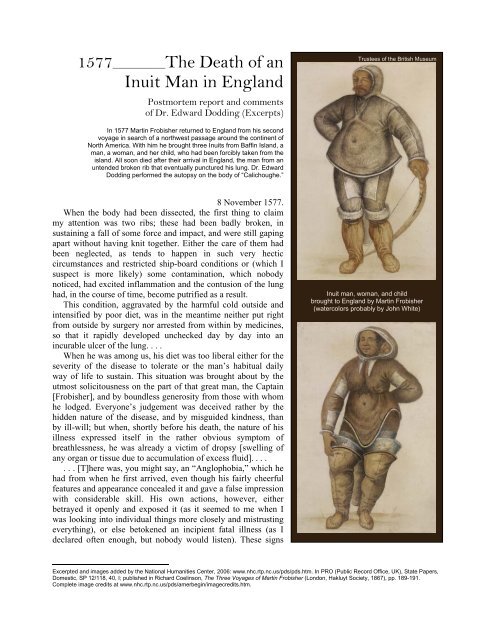
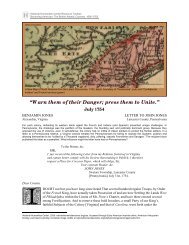
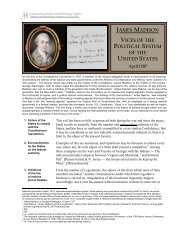
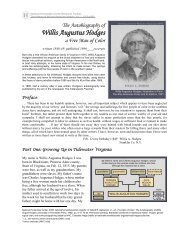
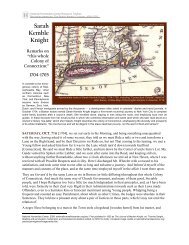
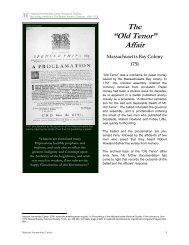
![The Requerimiento [Requirement], Council of Castile, 1510 ...](https://img.yumpu.com/21979685/1/190x245/the-requerimiento-requirement-council-of-castile-1510-.jpg?quality=85)
